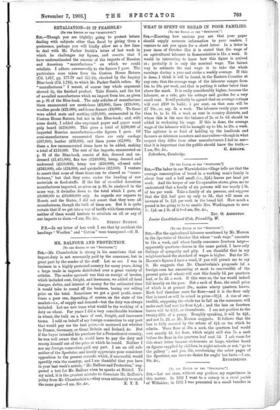[To THE EDITOR OF THE "SPECTATOR."] Sin,—For the agricultural labourer
mentioned by Mr. Marion in the Spectator of October 31st whose "cash wage" amounts to lls, a week, and whose family consumes fourteen large— apparently quarteni—loaves in the same period, I have only feelings of sympathy and pity. I am thankful that in my neighbourhood the standard of wages is higher. But for Mr. Marson's figures I have a word, if you will permit me to say it. He suggests that Mr. Chamberlain's proposals (of a foreign-corn tax amounting at most to one-twelfth of the present price of wheat) will cost this family id. per quarter?' loaf, or is. 2d. a week. If this were so, the tax would indeed fall heavily on the poor. But a sack of flour, the retail price of which is at present 28s., makes ninety quartern loaves. Each loaf therefore costs for flour—and it is the flour only that is taxed or will be raised in price-31N. A rise of one- twelfth, supposing the whole tax to fall on the consumer, will make each loaf cost for flour 41d.; and the loss on fourteen loaves will be 414d., or thereabouts. I am not positive to the twenty-fifth of a penny. Roughly speaking, it will be 40., and not is. 2d. as Mr. Manion suggests. It follows that the loss is fully covered by the rebate of 44d. on tea which he admits. Were flour at 30s. a sack, the quarter?' loaf would cost exactly 4d. for flour, which might still rise 7s. a sack before the flour in the quartern loaf cost 5d. I ask room for this short letter because statements at large, whether based on figures supplied by children in night-schools or not," go to the gallery " ; and you, Sir, overlooking the sober pages of the Spectator, can have no desire for aught but facts.—I am,






























































 Previous page
Previous page